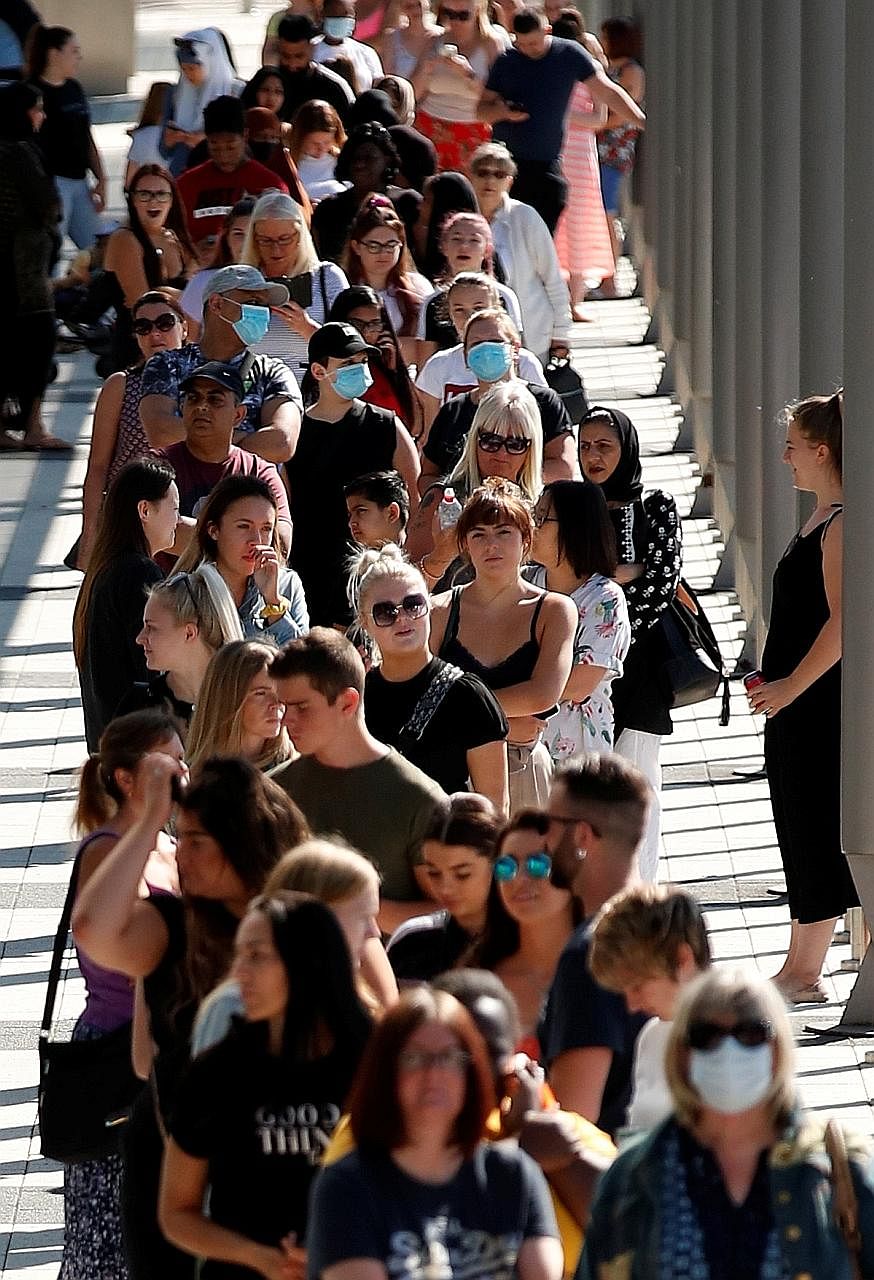LONDON • Retail outlets in England selling non-essential items opened yesterday for the first time since March, as the government eased restrictions to curb the coronavirus.
Businesses have installed sneeze screens, "sanitation stations" and other features to make shopping more hygienic once they open up. Whether customers will feel safe enough to return in large numbers remains to be seen.
Getting people back into stores is crucial for Britain's £400 billion (S$700 billion) retail industry and for the country at large, which relies on consumer spending for about 60 per cent of its gross domestic product.
Retailers employ more than three million people and contribute to the social and economic fabric of town centres across England.
At its flagship outlet on Oxford Street in London, Marks & Spencer has installed at least 20 large signs, 150 floor markings to reinforce the need for social distancing, sneeze screens at 11 checkout points and hand sanitiser units at its main entrances. Changing rooms and cafes will be closed, and services such as bra fitting have been paused.
Other retailers are taking similar steps.
"We'd certainly like to return some confidence to our high street, given that it's been three months in lockdown," Mr Jace Tyrell, chief executive of New West End Company, which represents more than 600 businesses in London's West End, told Bloomberg TV. "But it's going to feel very different out there."
The British economy shrank by a fifth in April, and could be headed this year for its biggest contraction in three centuries.
To encourage consumers to hit the stores, Prime Minister Boris Johnson said during a Sunday trip to Westfield mall that rules requiring people to stay 2m apart in public spaces could be eased as infection rates fall. "People should shop, and shop with confidence," he said.
"I think social distancing and safety, of course we have to prioritise that," said Mr Tyrell. "But the difference between 2m and 1m, if you take the hospitality sector, the restaurants... the difference is between 30 per cent trade and 70 per cent trade, so it's a massive game changer."
Desperate to restart the economy, Mr Johnson must avoid unleashing a second wave of the virus.

Britain has lagged behind its European neighbours in its handling of the pandemic and in getting businesses back up and running.
More than 41,700 people have died from the virus in Britain, the highest death toll in Europe, undermining confidence in the government and leaving many concerned about returning to crowded trains, town centres and shopping malls.
The crowded daily commute in London has long been a source of misery for millions. But getting to work will be even more of a challenge now.
Capacity on the transport network in one of the world's biggest financial hubs has been reduced by 85 per cent to comply with social distancing rules, protecting commuters by preventing them from cramming into trains and buses.
Everyone using public transport must also now wear a face covering.
And as lockdown restrictions are gradually eased, many face the quandary of how to reach the City of London, Canary Wharf and other business areas both quickly and safely.
"The Covid-19 crisis is making us have to radically rethink the way we move around our city, how transport operates," said Mr Will Norman, the London mayor's commissioner for walking and cycling.
"Forty years of public policy about transport has gone into reverse," said Professor Tony Travers of the London School of Economics. "This is a big existential issue for cities."
Even a small increase in the number of car journeys would lead to gridlock, Mr Norman warned.
Before the pandemic, up to five million people a day packed onto the London Underground and one million arrived by train.
After working successfully from home during the lockdown, some may continue doing so. Others will be considering alternative ways to get to work.
The London authorities are adding new routes for cyclists and pedestrians, and boat operators are considering increasing their services on the River Thames which runs through the city.
Bike sales tripled in March and April compared with last year, said Mr Terry Green of the Brixton Cycle cooperative in south London.
"Every time we order bikes, they just go straight out," he said.
BLOOMBERG, REUTERS
